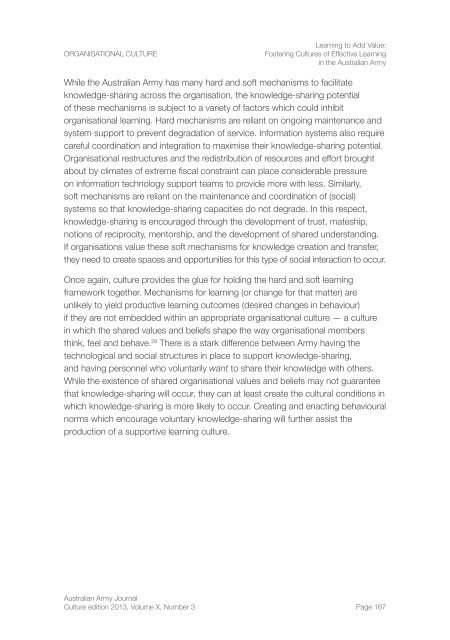Australian Army Journal
Australian Army Journal
Australian Army Journal
Create successful ePaper yourself
Turn your PDF publications into a flip-book with our unique Google optimized e-Paper software.
ORGANISATIONAL CULTURE<br />
Learning to Add Value:<br />
Fostering Cultures of Effective Learning<br />
in the <strong>Australian</strong> <strong>Army</strong><br />
While the <strong>Australian</strong> <strong>Army</strong> has many hard and soft mechanisms to facilitate<br />
knowledge-sharing across the organisation, the knowledge-sharing potential<br />
of these mechanisms is subject to a variety of factors which could inhibit<br />
organisational learning. Hard mechanisms are reliant on ongoing maintenance and<br />
system support to prevent degradation of service. Information systems also require<br />
careful coordination and integration to maximise their knowledge-sharing potential.<br />
Organisational restructures and the redistribution of resources and effort brought<br />
about by climates of extreme fiscal constraint can place considerable pressure<br />
on information technology support teams to provide more with less. Similarly,<br />
soft mechanisms are reliant on the maintenance and coordination of (social)<br />
systems so that knowledge-sharing capacities do not degrade. In this respect,<br />
knowledge-sharing is encouraged through the development of trust, mateship,<br />
notions of reciprocity, mentorship, and the development of shared understanding.<br />
If organisations value these soft mechanisms for knowledge creation and transfer,<br />
they need to create spaces and opportunities for this type of social interaction to occur.<br />
Once again, culture provides the glue for holding the hard and soft learning<br />
framework together. Mechanisms for learning (or change for that matter) are<br />
unlikely to yield productive learning outcomes (desired changes in behaviour)<br />
if they are not embedded within an appropriate organisational culture — a culture<br />
in which the shared values and beliefs shape the way organisational members<br />
think, feel and behave. 28 There is a stark difference between <strong>Army</strong> having the<br />
technological and social structures in place to support knowledge-sharing,<br />
and having personnel who voluntarily want to share their knowledge with others.<br />
While the existence of shared organisational values and beliefs may not guarantee<br />
that knowledge-sharing will occur, they can at least create the cultural conditions in<br />
which knowledge-sharing is more likely to occur. Creating and enacting behavioural<br />
norms which encourage voluntary knowledge-sharing will further assist the<br />
production of a supportive learning culture.<br />
<strong>Australian</strong> <strong>Army</strong> <strong>Journal</strong><br />
Culture edition 2013, Volume X, Number 3 Page 167

















